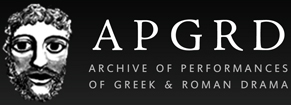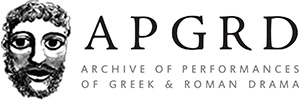1.1 Reference code:
Ley
1.3 Dates:
1921-1971
1.5 Extent and media:
17 boxes (plus 9 boxes of duplicated print material).
2.1 Creator:
Wilhelm Leyhausen (1887-1953); Anne-Marie Leyhausen (née Loose; materials from 1953 onwards).
2.2 Administrative History:
The Leyhausen-Spiess collection contains the collected papers of Professor Wilhelm Leyhausen (1887-1953), founder of the Delphic Institute and the Collegium Delphicum, and of his wife, Anne-Marie Loose Leyhausen who took over the running of the Delphic Institute and Collegium Delphicum after her husband’s death in 1953. The collection documents the significant contribution made to the revival of Greek and Roman drama by Professor Leyhausen and the Delphic Institute, and dates from 1921 to 1971 approximately. The collection’s 26 boxes contain production and rehearsal photographs, personal photographs, programmes, leaflets, booklets, audio reels (with digitized files stored on CDs), journals, newspaper cuttings, correspondence, lantern slides, glass plates, promptbooks and production posters.
Inspired by Eva Palmer and Angelos Sikelianos’ Delphic Festival of 1927, Leyhausen set up the Delphic Institute in 1947 locating the headquarters in Mainz. The aim of the Delphic Institute was to encourage students of primarily (but not exclusively) European universities, schools and amateur dramatic societies to stage plays in venues around Europe. These groups were brought together to participate in the ‘Delphiad’ festivals every year or two from 1950 to 1966 as a chance to share their performances, as part of the post-war spirit of European cooperation, with a wider audience. The material in the collection documents these performances through multiple media. In addition to the Delphiads and Delphic Institute material, the collection contains materials documenting Leyhausen’s early experimental productions of tragedy, in particular the plays of Aeschylus and of Goethe, in the 1920s along with other productions that Leyhausen and/or his wife attended.
The Delphic Institute finally closed in the late 1960s. After Anne-Marie Loose Leyhausen’s death in the 1970s the collection was transferred from Mainz to the home of the Institute’s former secretary, Eberhard Spiess in Wiesbaden. David Raeburn (New College, Oxford and former member of the Delphic Institute) brought the collection to our attention and arranged a meeting with Herr Spiess; the collection was transferred to the APGRD in Oxford by Pantelis Michelakis in 2001 and an initial accessions list and repackaging was undertaken by Michelle Paull. Naomi Setchell, APGRD archivist, repackaged the collection to archival standard and is author of the catalogue.
2.3 Archival History:
3.1 Scope and Content:
Production and rehearsal photographs, personal photographs, programmes
3.3 Accruals:
3.4 System of Arrangement:
Sub-fonds: Leyhausen collection
Series: Friedrich Wilhelm Universität Berlin (Sprech-chor)
Series: Delphic Institute
Sub-series: 1927 Delphic Festival
Sub-series: Collegium Delphicum productions
Sub-series: Delphic Institute Administration
Sub-series: Delphiads
Series: Productions attended in location by W and/or AM Leyhausen
Series: Wilhelm and Anne-Marie Loose Leyhausen collected papers
4.1 Conditions of Access:
Consult archivist
4.3 Languages and Scripts:
German, English, French, Spanish, Portuguese, Italian
4.5 Finding Aids:
Box list available
6.1 Archivist's note:
Sub-fonds level description created by Naomi Setchell in 2011
7.2 Rules and Conventions:

